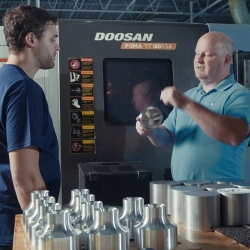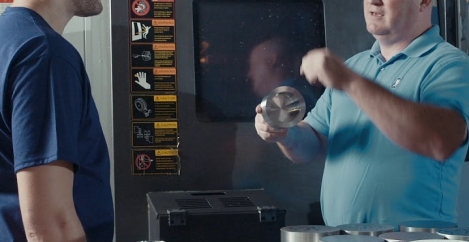December 14, 2021
Why employee development is vital in manufacturing
 Employee development is vital in any sector of work. Your business is only as good as the employees you have on board working with you to drive it forward. Continuously developing these employees and enriching their careers is a vital part of ensuring that they are happy and fulfilled at work.
Employee development is vital in any sector of work. Your business is only as good as the employees you have on board working with you to drive it forward. Continuously developing these employees and enriching their careers is a vital part of ensuring that they are happy and fulfilled at work.
This is particularly true in the manufacturing industry. In this article, we explore why employee development is vital in the manufacturing industry and the ways in which manufacturing companies can increase and improve their workforce’s development.
Technology-driven
Manufacturing is at the cutting edge of everything and as an always changing and growing industry, it is in a constant state of evolution. Organisations must continuously embrace change in order to stay competitive within their markets.
Technology has arguably been the biggest game-changer in recent times for the manufacturing industry. And whilst technology has made things much easier for manufacturing workers by taking over dangerous procedures and speeding up assembly processes, computer-aided manufacturing is simply not possible without a skilled and highly-trained workforce.
As new technologies continue to be introduced, there is no way of ensuring that your business will be at the forefront without firstly ensuring that your employees have the opportunity to master these innovations and become leaders in this new technology, such as automation and cobots.
Investing in training opportunities for employees allows an individual to see their future in a company, and when it comes to staying abreast of technology, that can be an exciting future indeed. Plus, engaged employees with continuously evolving skills result in increased staff retention, which, in an industry suffering a skills shortage, is an incredibly valuable thing.
Tackling the skills shortage
As the baby boomers begin to retire, a skills gap is being left in their wake. Unfortunately, the perception of STEM careers has suffered in recent times, deemed less desirable in the UK than in other countries, and as a result, less and less young people are actively turning to careers in manufacturing.
Work to rectify this is ongoing. In the meantime, rather than focusing on the employees you don’t have, focus on the ones you do. Let employees know that you value them. It’s really important to give the current manufacturing workforces all the opportunities they need to fill these skills gaps internally by offering high-quality and diverse training opportunities.
Manufacturing has a proud heritage of promoting staff internally. With such a wide range of roles and departments all rolled into one (programming, management, health and safety, human resources etc), every employee should be given the opportunities to move upwards and sideways within the company, whichever direction they see their career taking them. By offering these options internally, there’s no need for your employees to look to the competition for a change of scenery. Not only does this increase employee retention, but it’s also an attractive prospect for any young people that do decide that manufacturing is the right career path for them.
Strong teamwork makes the dream work
Whilst employee development can sometimes feel like something that revolves around the individuals, creating strong teams also plays a big part here too. A job in manufacturing is typically not one where you work alone without communicating to others throughout your working day. It’s important that manufacturing teams work well together to move projects through to the next stage and solve any problems that might arise.
Manufacturing companies should invest in team-building strategies to strengthen their teams and in turn, each employee’s sense of belonging and sense of camaraderie. Not only this, but train teams together on new processes and new technologies. This way, everyone has a clear idea of their role within the team and how they will all come together.
Having an ongoing focus on employee development will ensure that manufacturing companies can empower and retain their crucial talent. Allowing employees to reach their full potential will mean that they are less likely to be looking for opportunities elsewhere, meaning you can enjoy a workforce with years of rich experience in working for your organisation and it’s goals.















